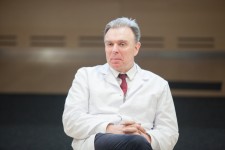
Brussels, Belgium , August 8, 2017 (Newswire.com) - Andrew De Niese is a Belgian psychologist who has studied and researched Asperger's syndrome for over 15 years, and has been traveling throughout Europe to share his findings and knowledge on the topic. His latest destination was Romania, which is notorious for having a culture that stigmatizes and questions the credibility of psychological disorders and new research findings.
Andrew De Niese says, "The culture of Europe is very different to that of the United States. Generally speaking, people here have a very dismissive attitude towards such medical findings which lead to a plethora of undiagnosed cases and deterioration of the quality of life of those who suffer from the disorder. Even today there is so much controversy surrounding Asperger's. Well firstly, as of 2014, the medical community’s holy bible, the Diagnostic and Statistical Manual of Mental Disorders, no longer diagnose Asperger's separately but rather considers it a part of Autism Spectrum Disorder, or ASD. What causes the onset of this disorder is still inconclusive, but we have found that it usually sets in by the age of 2 years.
Well I had to get through so much bureaucratic rigmarole to get the permission to do it, but in the end, it was well worth it. My talks with the students were limited compared to the time I spent with the counselors and mental health care professionals. But they all got to learn about the recommended services that could support those with ASD to live a healthier and more fulfilling life. I taught them at length about the benefits of cognitive behavioral therapy to combat the issues that are a result of emotions and obsessions.
Andrew De Niese
"Don’t buy into the myths that fly around; they all stem from unawareness. ASD is not a disease that needs to be treated, it’s more of a difference. It’s been called high-functional autism to differentiate it from the general umbrella of Autism. People with ASD are well-developed language and cognitive skills, with most displaying exemplary and in-depth knowledge of particular areas of high interest to them. However, their social skills and motor development largely lag behind the rest of the world. They have trouble reading social situations and cues and often lack the ability to empathize with others. ASD manifests physically as well through repetitive motions and gestures."
Andrew De Niese held educational seminars and workshops at schools, colleges, and mental health hospitals in Romania to shed light on the diagnosis and treatment of the disorder. "Well, I had to get through so much bureaucratic rigmarole to get the permission to do it, but in the end, it was well worth it. My talks with the students were limited compared to the time I spent with the counselors and mental health care professionals. But they all got to learn about the recommended services that could support those with ASD to live a healthier and more fulfilling life. I taught them at length about the benefits of cognitive behavioral therapy to combat the issues that are a result of emotions and obsessions. I also gave instructions on how to use physical therapy, speech therapy, as well as methods for training proper social and adaptive skills.
"Apart from behavioral training, the use of prescribed medication such as SSRIs or antipsychotics is also recommended. With proper therapy and positive reinforcement, many of those who suffer from ASD learn to face their challenges in a healthier way. Although their interaction skills and relationships might not see much improvement, they do manage to have successful careers. In fact, the number of people with ASD who have jobs is twice the number of people who suffer from autism."
Andrew De Niese's seminars had a far reaching impact in Romania as was evidenced by the myriad of social media posts acknowledging his ground-break research and work regarding ASD. Ana Botezatu, a well-respected Romanian psychologist, attended De Niese's workshops and was left very impressed. She said, "My daughter has ASD. I, myself being a psychologist with so many years of experience, could put my finger on what was different about her. We took her to America and that's where we learned about ASD.
"Andrew's vast knowledge and research in this field gives me hope that my daughter and several others like her who never get the correct diagnosis, will eventually be able to cope with this communication disorder. It's great that there are people like Andrew who spend their lives working on something that can essential gift a better life to others." With all this praise and appreciation coming De Niese's way, his contribution to society is clearly evident. Raising awareness about this disorder in various parts of the world that might not have made advancements in the field of medicine and neurological disorders can go a long way to giving people with ASD a shot at a healthier and happier life.
Press Contact: Eric Blankenship 786-332-6554
Source: Andrew De Niese
Share: